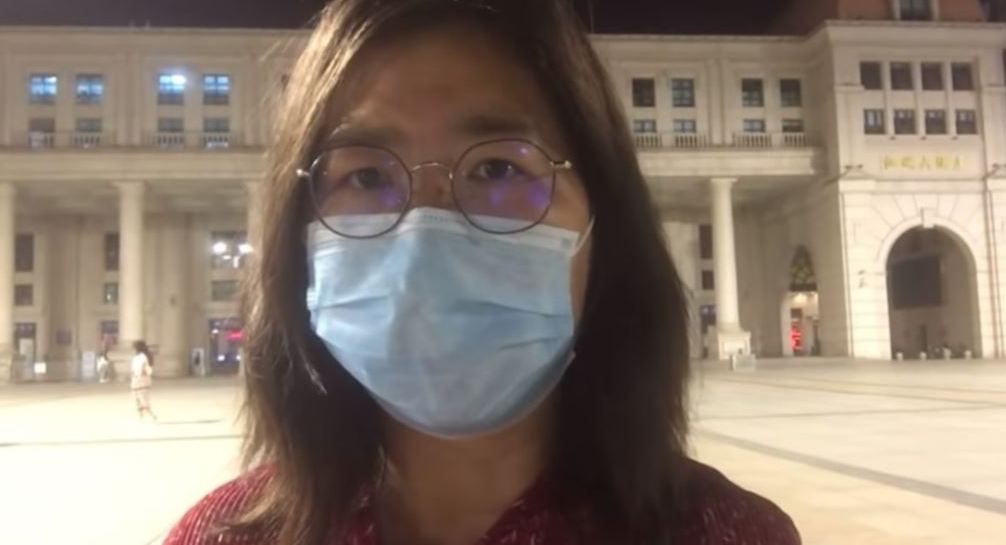Authorities in Shanghai have formally arrested a lawyer-turned-citizen journalist who reported on the emerging coronavirus epidemic in the central Chinese city of Wuhan.
Zhang Zhan, who lives in Shanghai but who traveled to Wuhan in early February, was taken away from Wuhan’s Caiguang Hotel near Hankou railway station on the night of May 14.
She was held by police near her home in Shanghai’s Pudong district on suspicion of “picking quarrels and stirring up trouble,” a charge frequently used to target peaceful critics of the ruling Chinese Communist Party.
Zhang was then formally arrested on that charge on June 19 on the orders of the Pudong state prosecutor, RFA has learned. She is currently being held in the Pudong Detention Center.
Repeated calls to Zhang’s mother rang unanswered on Monday.
But a friend of Zhang’s surnamed Zhu said she had denied the charges when she met with her defense attorney two weeks earlier.
“Zhang Zhan has been formally arrested for picking quarrels and stirring up trouble,” Zhu said. “Shortly after Zhang Zhan was detained, a lawyer went to Pudong Detention Center to meet with her, and she told him she was pleading not guilty.”
Zhu said Zhang’s mother had received a notification of her daughter’s arrest, but was too frightened to talk to journalists following heavy pressure from state security police, and hadn’t publicized the arrest details.
Zhu said her friend had traveled to Wuhan after lockdown began purely to report on the situation there.
“She found a way to get into Wuhan after the city was locked down,” Zhu said. “That was such a big risk to take; she has an extraordinary spirit not available to most people, to the extent that she was willing to risk arrest, and even her life.”
‘She is very strong-minded’
An overseas-based friend of Zhang’s surnamed Lang said he was sad to learn of her arrest.
“I had been expecting it, though, because this isn’t her first rodeo,” he said. “She was previously detained for supporting the anti-extradition movement [in Hong Kong].”
“I am worried about her, because she is a practicing Christian with a strong tendency towards martyrdom,” he said. “She is very strong-minded.”
Zhang, 40, was detained by police in Shanghai in September 2019 for holding up an umbrella in solidarity with the Hong Kong pro-democracy movement on the streets of Shanghai, and demanding an end to Communist Party rule.
She was released after 65 days in detention, during which time she went on hunger strike twice.
Zhang moved to Shanghai from the northern province of Shaanxi in 2010, and formerly worked as a lawyer before official retaliation took away her license to practice.
In Zhang’s last YouTube video posted on May 13, she had reported on the impact of a huge fall in passenger numbers on the livelihoods of Wuhan’s taxi drivers, as well as loss of employment in the wake of the lockdown among the city’s residents.
She also spoke out against the intimidation of local people by the urban management police, or chengguan, and about a sense of despair at life in China.
Thousands targeted for speaking out
The Chinese government has targeted thousands of people for speaking out about the coronavirus epidemic in the country since it began in late December in the central city of Wuhan.
After President Xi Jinping said he would lead “a people’s war” on the epidemic on Jan. 20, police handled 5,111 cases of “fabricating and deliberately disseminating false and harmful information,” according to a Feb. 21 statement from the ministry of public security.
Between Jan. 1 and March 26, nearly 900 internet users were penalized by police for their online speech or info-sharing about the coronavirus epidemic, across almost every province, region, and municipality in China.
Charges used to question, detain, and arrest people included “rumor-mongering,” “fabricating false information,” “sowing panic,” “disturbing public order,” and “breach of privacy.”
Cases in which people were accused of “spreading misinformation” or “disrupting public order” accounted for more than 96 percent of cases, according to the overseas-based Chinese Human Rights Defenders (CHRD) network.
CHRD said on Monday it has documented “a dozen cases” of detainees or prisoners of conscience being denied access to their lawyers and families, including virtual meetings, on coronavirus grounds.
The group called on the government to stop using the pandemic as a pretext to restrict people’s rights.
“In some instances, Chinese officials have stated that the suspensions are “indefinite” or until the pandemic is over, even if lockdown restrictions elsewhere have already begun to be lifted and authorities have declared that public health milestones have been met,” CHRD said in a statement on its website.
Among those affected are ailing citizen journalist and rights activist Huang Qi, veteran dissident Qin Yongmin, Tibetan activist and businessman Tashi Wangchuk, and activist Chen Jianfang.
Detained lawyers Hao Jinsong and Li Yuhan have also been denied meetings with their defense lawyers, as have detained activists Liu Jinxing, Shen Liangqing, Xie Wenfei, Xu Kun, and Zhang Baocheng, CHRD said.

